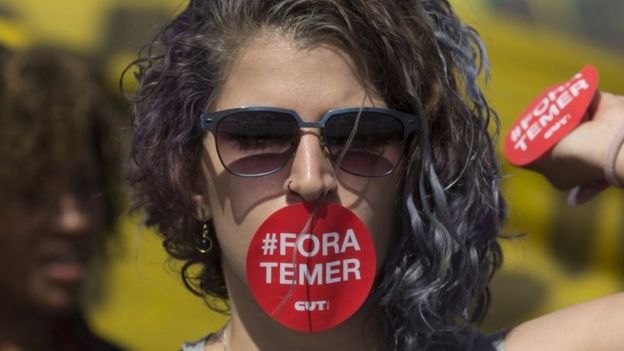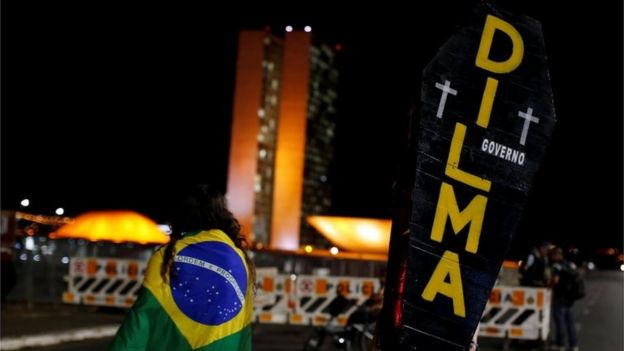
This article is more than
9 year oldIt puts an end to the 13 years in power of her left-wing Workers' Party. Ms Rousseff had denied the charges.
Sixty-one senators voted in favour of her impeachment and 20 against, meeting the two-thirds majority needed to remove her from the presidency.
Michel Temer has been sworn in as president and will serve out Ms Rousseff's term until 1 January 2019.
The centre-right PMDB party politician had been serving as acting president during the impeachment proceedings.
Ms Rousseff did win one battle on Wednesday - a Senate vote on banning her from public office for eight years failed to pass, meaning she could in theory return to politics.
Pledging to appeal against her impeachment, she told her supporters: "Right now, I will not say goodbye to you. I am certain I can say: 'See you soon.'"
She added: "They have convicted an innocent person and carried out a parliamentary coup."
Venezuela's leftist government reacted to the vote by removing its ambassador and freezing relations with Brazil.

Ms Rousseff was suspended in May after the Senate voted to go ahead with the impeachment process.
She was accused of moving funds between government budgets, which is illegal under Brazilian law.
Her critics said she was trying to plug deficit holes in popular social programmes to boost her chances of being re-elected for a second term in October 2014.

Ms Rousseff fought the allegations, arguing that her right-wing political rivals had been trying to remove her from office ever since she was re-elected.

She said that she was being ousted because she had allowed a wide-ranging corruption investigation to go ahead, which resulted in many high-profile politicians being charged.
Dilma Rousseff's impeachment trial in the Senate has raised important questions about Brazil's democratic institutions.
Was she ousted for having committed a crime - or was that just a pretext to remove a president who had lost control of the economy and politics?
Her fiscal manoeuvres were thoroughly examined during the sessions, but it was not just that which was on trial.
Her government policies, her U-turn on the economy after the election and corruption in her party were constantly part of the debate.
Also, as the trial unfolded, Michel Temer's interim government started its work reforming the economy and outlining new policies.
Senators - and Brazilians - knew that the question of condemning Ms Rousseff went beyond just deciding technically whether she was guilty or not.
Read Daniel Gallas' analysis in full
But senators who voted in favour of her impeachment said it was Ms Rousseff and the Workers' Party who were corrupt and needed to go.
Brazilians have been divided on the issue, with many expressing their support and loyalty to Ms Rousseff while others have taken part in large demonstrations demanding that she stand down.
 \
\
Mr Temer, who will govern until 1 January 2019, has promised to boost Brazil's economy, which is going through its longest and deepest recession in the past quarter of a century.
His critics have already warned that he plans to cut many of the popular social programmes introduced by the Workers' Party.